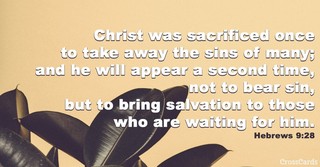
- Recent Translations
- All Translations
Hebrews 9:24
Share
Settings
Images for Hebrews 9:24

Hebrews 9:24 Meaning and Commentary
For Christ is not entered into the holy places made with
hands
The most holy place in the tabernacle of Moses, or in the temple built by Solomon, and rebuilt by Zerubbabel, and repaired by Herod,
which are the figures of the true;
that is, the most holy place in the tabernacle and temple, was a figure of the truth of that type; see ( Hebrews 9:9 ) as follows. Josephus F13 suggests the same, when speaking of the most holy place; he says, that it was inaccessible to the priests, that it might be as heaven to God.
But into heaven itself;
not the visible heavens, the airy and starry ones, through which he passed, but the third heaven, the habitation of God, angels, and glorified saints: this shows that heaven is a place; that Christ, as man, was out of it when on earth; and that at his ascension he entered into it, having done the work he came about, and that with acceptance: the end of his entrance was
now to appear in the presence of God for us;
Christ, as God, was always in his presence, from everlasting; as Mediator, he was with him in the council of peace; while he was here on earth his Father was with him, he was not alone; but now in his human nature he is at his right hand, where he appears before him, as a favourite before his Prince, on the behalf of another, or as an advocate on the behalf of his client: Christ appears in the court of heaven for his elect, by representing their persons; by presenting himself, his blood, sacrifice, and righteousness, before God on their account; by introducing them into the presence of God, and offering up their prayers with the incense of his mediation; by presenting them to himself, and to his Father, and obtaining every blessing for them. And this he does "now", since his entrance; not that he did not appear before God for the saints of the Old Testament, for he was the angel of God's presence then, though he did not appear then in the manner he does now, as the Lamb in the midst of the throne, as if it had been slain; but it denotes the continuance and perpetuity of his appearance for his people; he is ever interceding for them.
F13 Antiqu. l. 3. c. 5. sect. 4. & c. 7. sect. 8.